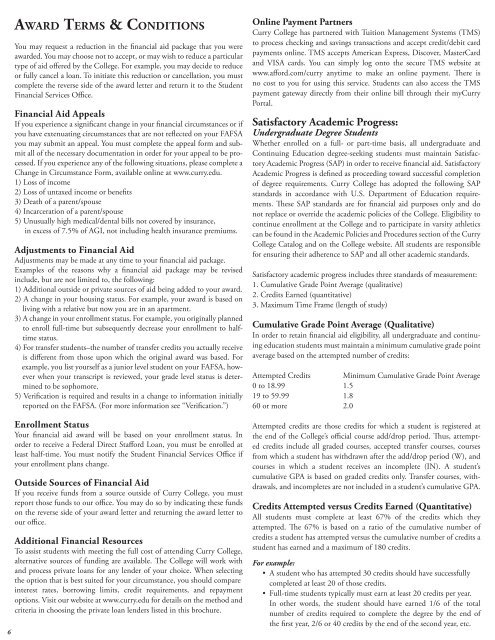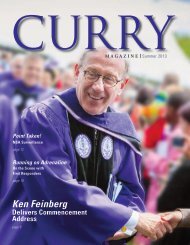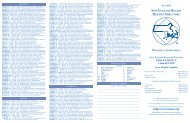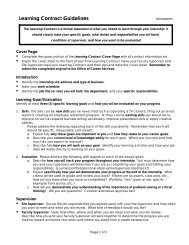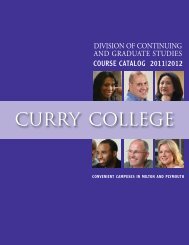FINANCIAL AID AWARD INFORMATION - Curry College
FINANCIAL AID AWARD INFORMATION - Curry College
FINANCIAL AID AWARD INFORMATION - Curry College
Create successful ePaper yourself
Turn your PDF publications into a flip-book with our unique Google optimized e-Paper software.
6Award Terms & ConditionsYou may request a reduction in the financial aid package that you wereawarded. You may choose not to accept, or may wish to reduce a particulartype of aid offered by the <strong>College</strong>. For example, you may decide to reduceor fully cancel a loan. To initiate this reduction or cancellation, you mustcomplete the reverse side of the award letter and return it to the StudentFinancial Services Office.Financial Aid AppealsIf you experience a significant change in your financial circumstances or ifyou have extenuating circumstances that are not reflected on your FAFSAyou may submit an appeal. You must complete the appeal form and submitall of the necessary documentation in order for your appeal to be processed.If you experience any of the following situations, please complete aChange in Circumstance Form, available online at www.curry.edu.1) Loss of income2) Loss of untaxed income or benefits3) Death of a parent/spouse4) Incarceration of a parent/spouse5) Unusually high medical/dental bills not covered by insurance,in excess of 7.5% of AGI, not including health insurance premiums.Adjustments to Financial AidAdjustments may be made at any time to your financial aid package.Examples of the reasons why a financial aid package may be revisedinclude, but are not limited to, the following:1) Additional outside or private sources of aid being added to your award.2) A change in your housing status. For example, your award is based onliving with a relative but now you are in an apartment.3) A change in your enrollment status. For example, you originally plannedto enroll full-time but subsequently decrease your enrollment to halftimestatus.4) For transfer students–the number of transfer credits you actually receiveis different from those upon which the original award was based. Forexample, you list yourself as a junior level student on your FAFSA, howeverwhen your transcript is reviewed, your grade level status is determinedto be sophomore.5) Verification is required and results in a change to information initiallyreported on the FAFSA. (For more information see “Verification.”)Enrollment StatusYour financial aid award will be based on your enrollment status. Inorder to receive a Federal Direct Stafford Loan, you must be enrolled atleast half-time. You must notify the Student Financial Services Office ifyour enrollment plans change.Outside Sources of Financial AidIf you receive funds from a source outside of <strong>Curry</strong> <strong>College</strong>, you mustreport those funds to our office. You may do so by indicating these fundson the reverse side of your award letter and returning the award letter toour office.Additional Financial ResourcesTo assist students with meeting the full cost of attending <strong>Curry</strong> <strong>College</strong>,alternative sources of funding are available. The <strong>College</strong> will work withand process private loans for any lender of your choice. When selectingthe option that is best suited for your circumstance, you should compareinterest rates, borrowing limits, credit requirements, and repaymentoptions. Visit our website at www.curry.edu for details on the method andcriteria in choosing the private loan lenders listed in this brochure.Online Payment Partners<strong>Curry</strong> <strong>College</strong> has partnered with Tuition Management Systems (TMS)to process checking and savings transactions and accept credit/debit cardpayments online. TMS accepts American Express, Discover, MasterCardand VISA cards. You can simply log onto the secure TMS website atwww.afford.com/curry anytime to make an online payment. There isno cost to you for using this service. Students can also access the TMSpayment gateway directly from their online bill through their my<strong>Curry</strong>Portal.Satisfactory Academic Progress:Undergraduate Degree StudentsWhether enrolled on a full- or part-time basis, all undergraduate andContinuing Education degree-seeking students must maintain SatisfactoryAcademic Progress (SAP) in order to receive financial aid. SatisfactoryAcademic Progress is defined as proceeding toward successful completionof degree requirements. <strong>Curry</strong> <strong>College</strong> has adopted the following SAPstandards in accordance with U.S. Department of Education requirements.These SAP standards are for financial aid purposes only and donot replace or override the academic policies of the <strong>College</strong>. Eligibility tocontinue enrollment at the <strong>College</strong> and to participate in varsity athleticscan be found in the Academic Policies and Procedures section of the <strong>Curry</strong><strong>College</strong> Catalog and on the <strong>College</strong> website. All students are responsiblefor ensuring their adherence to SAP and all other academic standards.Satisfactory academic progress includes three standards of measurement:1. Cumulative Grade Point Average (qualitative)2. Credits Earned (quantitative)3. Maximum Time Frame (length of study)Cumulative Grade Point Average (Qualitative)In order to retain financial aid eligibility, all undergraduate and continuingeducation students must maintain a minimum cumulative grade pointaverage based on the attempted number of credits:Attempted Credits Minimum Cumulative Grade Point Average0 to 18.99 1.519 to 59.99 1.860 or more 2.0Attempted credits are those credits for which a student is registered atthe end of the <strong>College</strong>’s official course add/drop period. Thus, attemptedcredits include all graded courses, accepted transfer courses, coursesfrom which a student has withdrawn after the add/drop period (W), andcourses in which a student receives an incomplete (IN). A student’scumulative GPA is based on graded credits only. Transfer courses, withdrawals,and incompletes are not included in a student’s cumulative GPA.Credits Attempted versus Credits Earned (Quantitative)All students must complete at least 67% of the credits which theyattempted. The 67% is based on a ratio of the cumulative number ofcredits a student has attempted versus the cumulative number of credits astudent has earned and a maximum of 180 credits.For example:• A student who has attempted 30 credits should have successfullycompleted at least 20 of those credits.• Full-time students typically must earn at least 20 credits per year.In other words, the student should have earned 1/6 of the totalnumber of credits required to complete the degree by the end ofthe first year, 2/6 or 40 credits by the end of the second year, etc.


